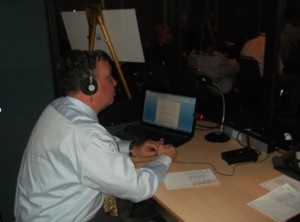Simultaneous interpretation, which is also referred to as Conference interpretation, should be distinguished from Consecutive interpretation. In the latter, the interpreter facilitates a conversation between two persons who otherwise would not understand each other and intervenes during pauses. Conference interpretation is meant for larger groups and there are no pauses. The interpreter just has to follow the flow.
For this reason, Simultaneous interpretation faces specific challenges. They must be addressed properly. Failing this, the conference, which organizers have taken great care in preparing, might derail and strip them of the return they were expecting.
The challenges and requirements may be ranked in order of increasing difficulty: the equipment – the interpreters and degree of preparation – the degree of alertness of the interpreters – the word flow and last but not least, fatigue.
In order to provide simultaneous interpretation, proper equipment is required. The equipment comes in two types: the standard and the portable systems
- The standard system, which is also the most common, is well suited for large conferences. It includes one or more booths of about 9’x4’ in size housing the interpreters, two headsets, two microphones fitted on a central console, infrared transmitters, headsets for the audience and a technician who installs the system before the conference, controls volume and sound balance during the conference and dismantles the system after the conference. The system can accommodate just two languages (for example, English into French and vice-versa) or an infinite number of languages if set on a more expensive relay mode.
- The portable system is the low cost option. Better suited to smaller groups, it fits into a backpack and does not require any setup. There is no booth, no infrared transmitters or technician. This low cost system allows for easy mobility from room to room (for example visiting a plant), but is taxing to the interpreters who are working without the benefit of a soundproof booth and therefore struggle sometimes to hear the speaker because of the effects of their own whispering in their hand-held microphones.
Conference interpretation often tests one’s improvisation abilities in that clients rarely furnish adequate and timely preparation material. I would almost be at a loss to tell you how often I have been called upon to serve at conferences without having the slightest idea of what it was about apart from a vague hint provided by the conference title. Not only should conference interpreters feel comfortable in a wide variety of subjects (engineering, medical, administration, sustainable development), but improvise in the heart of the action. Unlike the translator who may pause to check a word in a dictionary, this option is unavailable to the conference interpreter. If the right word does not immediately come to mind, use a synonym. Unlike the consecutive interpreter, conference interpreters cannot ask the speaker to repeat. He or she is expected to go along now matter how fast the speaker speaks or else will fall behind and risk allowing an ever greater slice of the discourse to go untranslated.
Fatigue: it should not come as a surprise to our distinguished reader that fatigue quickly becomes a factor after hours of alertness in a small and often hot enclosed space without proper air ventilation. True, interpreters work in teams of two or three, but this hardly mitigates the effects of fatigue. I would ready to bet that my personal performance erodes at the microphone after a few hours in a booth, especially after lunch, but surprisingly, no client has ever come to me to point this out. They are perhaps feeling the same as me…

Philippe Vitu interpreting in a booth at a recent conference in Montreal.
Conference interpreting has its challenges, but it is very gratifying indeed. Not all language providers are wired for it. The best compliment a client can address to me comes in the form of a question that I have often heard: “I wonder how you guys can do that”. Well, we just do it….
